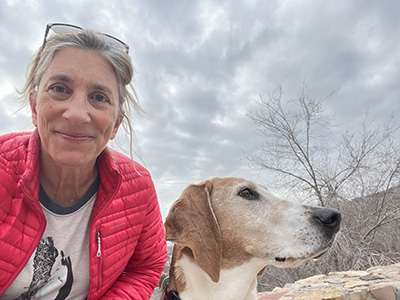Staff Spotlight: Cory Pike
Cory Pike is thrilled to work with the students and faculty in the Environmental Humanities Program, and to be part of the College of Humanities. Educated at Wesleyan University (Classics) and then as a librarian (University of Washington, MLIS) , she worked in academic, local government and corporate settings for more than ten years in that role before taking time away to raise her young kids and volunteer in the Salt Lake City public school system. Outside of EH, you might find her wrangling her hound dog in the Wasatch foothills, or at farmers’ markets. She is a youth Ultimate coach, new birder, fan of Great Salt Lake, a dry-land gardener, swimmer, and interested in all food growing, production and preparation.

Below are Cory's written responses to my questions about her diverse background in classics and librarianship, passion for environmental issues, role as the Academic Program Manager.
- What drew you to the Environmental Humanities Graduate Program, and how does your background in Classics and librarianship influence your approach to managing the program?
Two things brought me to the Program – a trip to Yellowstone National Park to see wolves, and a friend! I spent a week in March of 2015 on a spring wolf-watching trip to YNP, and it was the first time I ever considered human management of ‘wild’ spaces. As someone who had spent lots of time outside observing plants birds and animals and entertaining myself in the Wasatch foothills/canyons and the shores and mountains of the Pacific Northwest, I had not considered human influence in those places. Shortly after that trip, then-director Jeff McCarthy, called to see if I would be interested in supporting the program. From what Jeff described, I thought this could be a good way to develop my interests in what I considered ‘the environment’. Plus, I like students and using tools of the humanities to solve environmental problems.
Studying classical history – I was a Roman history/Latin language & literature focus - was a great foundation for all the work I’ve done since I went to college. Being able to read, write, think critically, and engage politically are skills everyone in the humanities learns. One of my favorite parts of my job at the U is being a part of the College of Humanities, working with my admin and grad advising colleagues, talking to students, faculty, and staff across the variety of disciplines, and attending talks by our experts. And, as a librarian, I learned how to organize, create systems, and to connect folks to resources.
2. You’ve worked in various settings, including academic, local government, and corporate environments. How have these experiences shaped your role as the Academic Program Manager for the Environmental Humanities Program?
My work as a librarian in a variety of settings, and then in a volunteer capacity with the SLC Public School system all contribute perspective and skills to the work I do now. Librarians are educators, even in corporate settings, and strive to connect people with resources to do their jobs. I understand what it’s like to both support an organization and foster the success of the individual people in it.
3. Outside of your work, you have a diverse range of interests from swimming to dry-land gardening. How do these hobbies influence your perspective on environmental issues and your work with students and faculty in the program?
My hobbies are directly affected by environmental issues, access, inclusion, and climate change. They're similar hobbies that EH folks pursue and provide an easy way to make connections. We all think about outdoor spaces in a similar capacity. Mostly, I’m fortunate that my values, politics, and hobbies align with my work environment. The work I do to support our students, faculty, staff and alumni and their pursuit of environmental justice is the most important purpose I have outside my family.
Categories
Featured Posts
Tag Cloud
- community engagement (15)
- student (4)
- nuclear energy (1)
- community practitioner in residence (2)
- practitioner-in-residence (3)
- student spotlight (1)
- Great Salt Lake (1)
- art (1)
- activism (1)
- faculty (4)
- education (1)
- alumni (3)
- environmental literature (1)
- EH research professor (1)
- utah award in the environmental humanities (1)
- indigenous sovereignty (1)
- activist (1)
- downwinder (1)
- staff (1)
- students (2)
- thesis (2)
- project (2)
- exam (1)
- Native research methods (1)
- 1U4U (1)
- graduation (1)
- research (1)
- event (1)
- youth activism (1)
